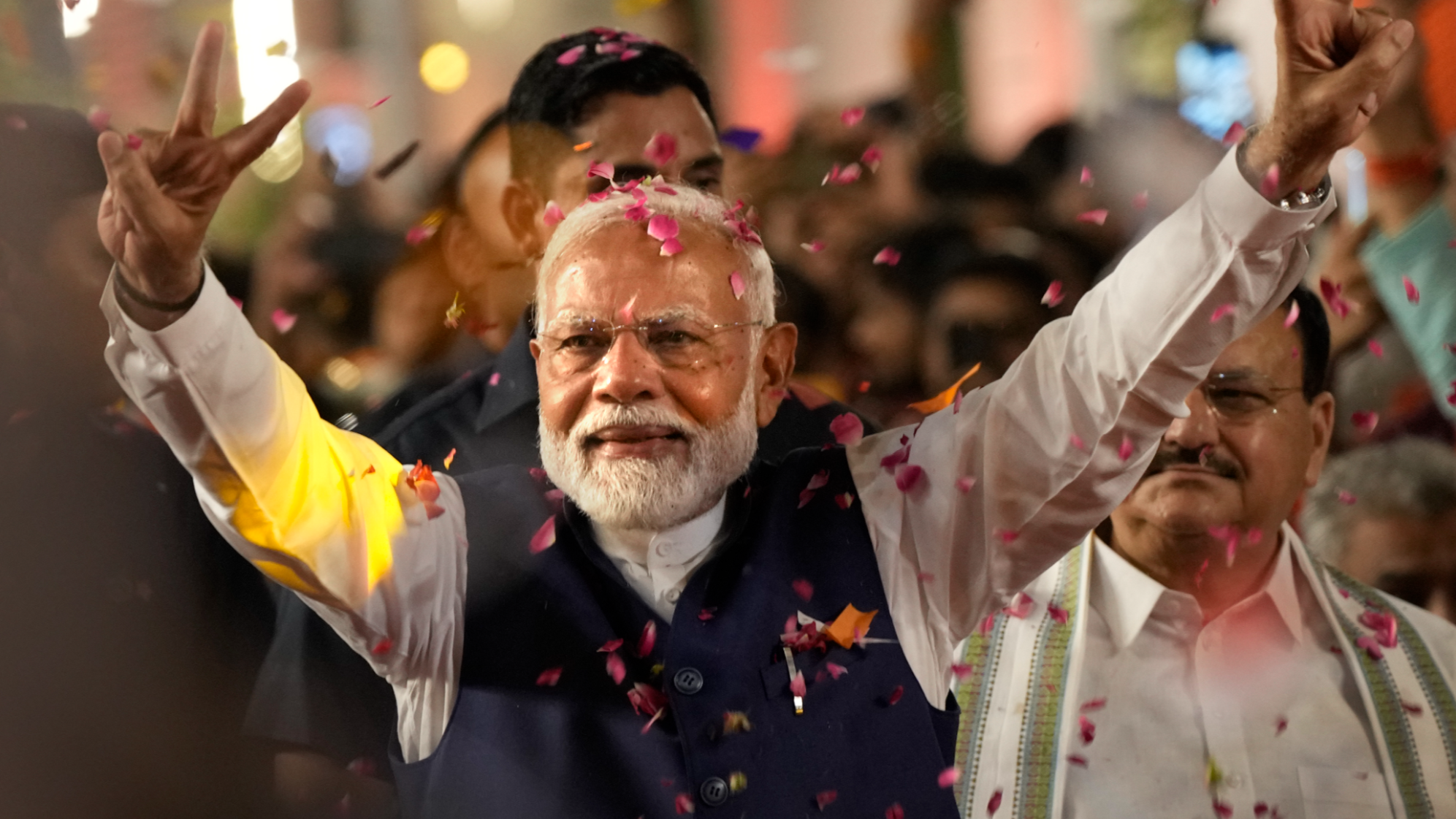
Prime Minister Narendra Modi is forced to rely on smaller regional parties to form the next government as his ruling Bharatiya Janata Party fails to maintain a majority in the new parliament.
Official results by Wednesday show the BJP winning 240 seats, short of the majority marker of 272, out of total 543 seats in India’s parliament, results announced by the Election Commission of India or ECI early Wednesday. It won 303 seats in 2019.
ECI on early Wednesday showed the National Democratic Alliance or NDA alliance led by BJP won 294 seats. The NDA collectively passed the majority mark in Parliament, according to the final confirmation of ECI
Speaking in late Tuesday evening at BJP headquarters in New Delhi, Modi emphasized that he would form a new government and work with smaller-party leaders to govern India as a coalition.
READ MORE: India's Modi casts his vote as giant election reaches half-way mark
Modi said: “In our third term, the country will write a new chapter of big decisions.” And, “this is Modi’s guarantee.”
The prime minister in his early 70s has taken a more positive view in a statement on X declaring that his coalition had won a third term. “This is a historical feat in India’s history,” he said.
ECI on early Wednesday showed the National Democratic Alliance or NDA alliance led by BJP won 294 seats. The NDA collectively passed the majority mark in Parliament, according to the final confirmation of ECI.
It is the first election that BJP under Modi’s leadership hasn’t scored an absolute majority since he became PM in 2014.
Modi is now the second prime minister to win a third consecutive term in India after Jawaharlal Nehru, the country's first premier after independence in 1947.
Yet the victorious fanfare could not hide a stunning blow that shattered Modi’s image of a most dominant Indian politician in decades, analysts said.
The return to federal coalitions marks a renewed emphasis on cooperative federalism and the new government will not be able to pursue its centralist agenda of uniformity as the basis of national unity, said Prof Balveer Arora, chairman of the Centre for Multilevel Federalism, New Delhi.
The Opposition INDIA bloc combined by Indian National Congress and other regional and smaller parties managed to secure 233 seats, failing to reach majority mark, according to the ECI.
India’s main opposition, Indian National Congress or INC, which dominated India for decades after independence but witnessed a decline in every election over the past ten years, has secured 99 seats and almost doubled their seats compared to the 2019 general election. INC is still refusing to give up, top leaders have called a meeting this afternoon with leaders of other regional parties to chalk out its next step.
“This was about saving the Constitution,” said Rahul Gandhi, INC leader and public face of the party on Tuesday evening. He alleged Modi has misused all government institutions to silence the opposition leaders through arrest and punitive steps.
BJP suffered its major setback in Uttar Pradesh in the north, India’s most populous state with about 240 million people. BJP is currently governing the state and had won 62 of the state’s 80 seats in 2019. This time the party managed to win just 33 seats from here. Victory margin from Varanasi, Modi’s constituency, has also been reduced from 2019.
BJP lost its Ram temple constituency of Faizabad as well. The loss in Faizabad constituency sends a message that Modi’s Hindutva sentiment had struggled to connect with voters, said Ramesh Jha, a resident of Ayodhya where Modi inaugurated a grand Ram temple in Jan this year to woo Hindu vote banks.
"The opposition got united due to the overemphasis on the Ram temple issue,” said Rakesh Yadav, a Mayur Vihar resident of New Delhi, India’s national capital where BJP won all seven parliamentary seats.
The decline in the seat tally of the BJP, even in its heartland bastions, shows that livelihood issues -- unemployment and inflation -- overcame the appeal to nationalist Hindu identity sentiments, Prof Arora underscored.
Neglecting regional political factors or issues, selection of candidates of BJP are largely responsible for the poor performance in UP, Rajasthan, Maharashtra and Haryana
Another biggest disappointment for BJP is in Tamil Nadu, India’s southern state where it did not manage to win any of the 40 seats. BJP, however, made history in Kerala, a southern state traditionally governed by Left Front or INC since independence by winning its maiden seat. In 2019 BJP failed to win even a single seat in three of the five southern states – Kerala, Tamil Nadu, and Andhra Pradesh.
Neglecting regional political factors or issues, selection of candidates of BJP are largely responsible for the poor performance in UP, Rajasthan, Maharashtra and Haryana. The second reason is that the BJP miscalculated two major issues, impact of Ram temple and Modi’s personal popularity did not work this time.
These two factors could not overcome local discontent, said Amit Rajendra Dholakia, a professor of the Department of Political Science at the Maharaja Sayajirao University of Baroda.
READ MORE: India votes in final phase as Modi and Rahul Gandhi eye victory
Opposition mobilized itself quite well at the ground level as well as in social media and public campaigns, pointed out Prof Dholakia.
Modi held about 200 rallies throughout the country over more than two months of campaigning and gave about 80 interviews to TV news channels and newspapers.
Most importantly, this time Rahul Gandhi worked hard and organized many rallies and emphasized on social welfare measure if returns to power during the campaign, said Tanvir Aeijaz, Prof Ramjas College, University of Delhi. Most importantly, INC managed to keep a good coalition without any bickering.
The writer is a freelance journalist for China Daily.


